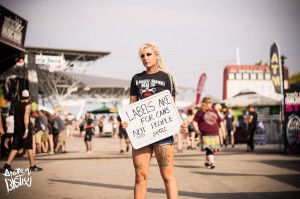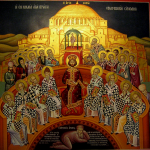There’s this saying that the whole is greater than the sum of its parts. People put all sorts of labels and preconceptions on women and we have this tendency that being a woman or being of a certain race, ethnicity, or sexuality means that we have to look and act a certain way. Sometimes, we believe society and think that we have to act like everyone else who has the same labels as us in order to belong. But the worst thing we could do to ourselves is allow circumstances like family problems or relationship issues to define who we are.
God created us a certain way for a reason, but he didn’t create us so that we define ourselves according to other people’s preconceptions. So the question is “How do we choose to define ourselves?” There is nothing wrong with being a woman or being of a certain race or ethnicity or even being attracted to the same gender. The problem is when we choose to define ourselves by just these things. The things that are in our lives are just parts of who we are and not the sum or the whole of who we are. I choose to define myself by my faith because my faith is so much bigger than myself. And there are things about my faith that I still have to learn and understand.
Marc Barnes AKA “Bad Catholic” on Patheos wrote that: “A label allows us to subsume ourselves into an abstract, and thereby cease dealing with immense difficulties of being our unique, particular ourselves. When I am truly silent and truly alone, I am alone with an I who finds himself living with no immediately discernible purpose, alone with an I who — quite naturally — feels the difficult desire to do good and avoid evil, to love the beautiful, to know the truth, an I with a conscience that constantly reminds me of my own inability to do any of these things, an I that doesn’t age but still is and feels like the same eternal I that lived and breathed at 10 years old. This is the I I return to when I am stripped of every external — of my ideology, career, possessions, class, race, and status — the I that must simply be, approaching death. This is, of course, terrifying.”
I was browsing my YouTube subscriptions when I came across a video that talked about forming identity. The person in the video said that identity is always fluid and changing and that only the individual has any control over his or her identity. While I agree that a person’s identity can change over time (growing from child to teen to adult, for example) I think that there are some parts about identity that never change.
I shared this video with my friend Marguerite, who said, “Our primary identity is as beloved children of God and that one cannot change and we do not control it. God will always love us no matter what we do. I agree with staying curious and exploring (within the limits of morality) and knowing that labels are flexible and that we change as time goes on. But the one point about who we are that is most important is the one that never changes from our birth to our death: it is who we are in the eyes of God.”
The difference between finding out your identity based on the world and letting God be the one to guide you in forming your identity is that the world always changes, but God never does. The beautiful paradox of letting God help us figure out who we are is that we become the best versions of ourselves through His help. Like Saint Paul said in Galatians 2:19-20: “I have been crucified with Christ; yet I live, no longer I, but Christ lives in me; insofar as I now live in the flesh, I live by faith in the Son of God who has loved me and given himself up for me.”
So no matter how you choose to define yourself, remember to put God at the center of your life and He will be there to help you when you need to define yourself. Before anything else, remember that you are God’s creation, a child of the One True King, adopted into the family, and a part of the mystical body of Christ. You are loved, you are cherished, and you are not alone.













